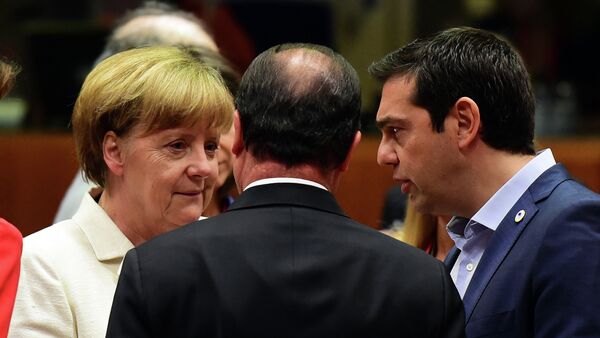The IMF's intervention heightened tensions ahead of Tuesday's Eurozone finance ministers' meeting in Brussels, with the Washington-based fund adding to concerns it will pull out of Greece's third bailout unless debt relief measures are implemented.
"The implementation of debt relief should be completed by the end of the program period", the IMF said.
"Providing an upfront, unconditional component to debt relief is critical to provide a strong and credible signal to markets about the commitment of official creditors to ensuring debt sustainability, which in itself could contribute to lowering market financing costs. An upfront component can also help garner more ownership for reforms."
Debt Relief on the Agenda
The issue of debt relief has been a key issue of disagreement between Greece's creditors, with Eurozone countries rejecting calls for a "debt haircut" which would essentially clear some of the debt owed by Athens to its creditors.
The German government insisted on the IMF’s participation. They must now accept IMF’s reasoning on debt relief for Greece.
— George A. Papandreou (@GPapandreou) May 24, 2016
While talk of a debt relief deal during Tuesday's meeting was shot down by Slovakian Finance Minister Peter Kazimir, Dr Vassilis Monastiriotis, associate professor of political economy at the London School of Economics, told Sputnik the IMF's pressure is likely to lead to a breakthrough on the issue.
"I think it's very unlikely that there is going to be an agreement or some sort of clear signal about debt relief at this stage… But I think at some point, because there is definitely a need for Eurozone partners to keep the IMF in, we will have this package of debt relief.
We believe that debt-relief talks & financial participation of International Monetary Fund can wait for later stage. #IMF #Greece #eurozone
— Peter Kažimír (@KazimirPeter) May 24, 2016
While there has been talk of a partial debt write-off, Dr Monastiriotis believes the Eurozone's concessions will be more conservative, and could involve changes to interest rates, as proposed by the IMF.
"It's not going to be a debt write-off, but it's going to be a debt relief along the lines of what the IMF has already put forward."
'Realization the Money Cannot Be Paid Back'
While critics of the Eurozone's policy have long said that Athens' debt is so great it cannot possibly be paid back on the terms of its current bailout deal, Dr Monastiriotis says the willingness of EU leaders to talk about some form of debt relief is a sign that they also accept the current deal is unsustainable.
Without huge debt relief & sharply lower budget surplus target, Greece's debt outlook out to 2060 is dire. Via IMF pic.twitter.com/a7Yged5s75
— Jamie McGeever (@ReutersJamie) May 24, 2016
"It [debt relief talk] is also a realization that this money — one way or another — cannot be paid back, or it would take many many decades for the money to be paid back, so in a way everyone realizes that the level of debt is so high, that it is impossible to credibly pay it back in any logical time horizon."
As a result, he believes talks will begin to try and find a debt relief deal that can be seen as a win in both Greece and across the Eurozone.


